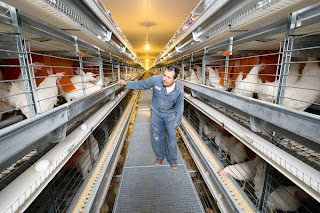Fighting for animal liberation and an end to speciesism
In a rare alliance, the Humane Society and egg ranchers lobby for federal legislation on the treatment of chickens that would override California's Proposition 2
The gigantic chicken coop at the JS West farm here is big enough to hangar a Boeing 747, and the clucks from 150,000 egg-laying hens make it almost as noisy as one.
 Jill Benson, whose family owns the place, is proud of the roomy cages, the clean, ventilated air and, yes, even the never-ending squawks from all those birds.
Jill Benson, whose family owns the place, is proud of the roomy cages, the clean, ventilated air and, yes, even the never-ending squawks from all those birds.
"They're singing because they're happy," she said.
If that's true, California voters can take some of the credit. Proposition 2, passed by a wide margin in 2008, requires chicken farmers to give their egg-laying birds enough room to stand and spread their wings.
Although farmers have until 2015 to implement the changes, JS West is one of the few to have already installed new cages in an attempt to comply with the law. The Central Valley company, which helped bankroll the campaign against Proposition 2, says it has spent more than $7 million for two barns filled with the new 4-by-12-foot cages, each holding 60 birds.
Like most egg ranches, JS West initially opposed the measure.
"That was our livelihood that was being threatened, and we fought it to the end," Benson said. "When we lost, we saw that California voters were asking for something different. We listened to what that vote said and tried to find a solution."
That solution may now be going national. In a rare alliance, the Humane Society of the United States and egg ranchers have joined forces to lobby for federal legislation that would set national standards for egg ranches similar to those implemented at JS West.
"No question about it: Proposition 2 was a major wake-up call to the entire U.S. egg industry," said Chad Gregory, senior vice president of United Egg Producers, a trade organization that represents most of the nation's egg farmers.
He and others believe the Humane Society support is crucial, since the group was one of the primary supporters of Proposition 2.
"The Humane Society could go into a state and say, 'You either work with us legislatively or we're going to do a ballot initiative in your state,'" Gregory said.
Not everyone favors the approach. If the federal legislation is signed into law, it would create one national standard and invalidate state and local laws, such as Proposition 2. Some animal-rights groups believe California's law could be replaced by a weaker standard. The proposed federal legislation, HR 3798, does not carry the threat of jail time, as Proposition 2 does, and it would prohibit states from banning cages.
It also would give farmers up to 18 years to phase in the changes, which some animal-rights groups say is too long.
"The Humane Society is now trying to undo Proposition 2," said Bradley Miller, director of the Humane Farming Assn. "They've switched sides. They've sold out. They're betraying not only California voters but millions of hens that are locked in horrific conditions."
The Humane Society counters that federal legislation imposing uniform standards nationwide would benefit more chickens than a piecemeal, state-by-state approach — especially since many states might refuse to pass any such laws at all.
"The federal legislation provides a pathway to give the birds a much better life," said Wayne Pacelle, the Humane Society's president and chief executive. "It's not perfect, but it is a dramatic improvement."
Among other things, the legislation would require that some farmers nearly double the amount of space they provide egg-laying hens. It's now common in some states for hens to be housed in less than 70 square inches — smaller than a sheet of printer paper.
California egg farmers say Proposition 2 had major flaws that federal standards could correct. For example, the state law does not specify how many square inches they need to provide their birds. Instead, it says hens should be able to "fully extend their limbs or wings, lie down, stand up and turn around."
Last month, Riverside County egg farmer William Cramer filed a federal lawsuit seeking to have Proposition 2 invalidated, saying it's "unconstitutionally vague" because it's not clear about how much space hens should have.
If the law withstands legal challenge, Cramer said, many farmers would shut down rather than pay to install large cages that may not comply with a vague law.
"Some farmers will exit the egg business altogether while others will move out of state," Cramer said in the lawsuit.
JS West filed a lawsuit against the state in 2010, seeking a judge's clarification about how much space it needed to provide its hens. A judge in Fresno County dismissed the lawsuit without providing that clarification.
So far, JS West has spent about $7.2 million to install two enormous barns — each holds about 150,000 hens — lined with 48-square-foot cages that are larger than those in its other barns.
http://human-nonhuman.blogspot.ie/2012/06/messy-business-of-regulat...
Views: 50
© 2025 Created by Animal Rights Zone.
Powered by
![]()
